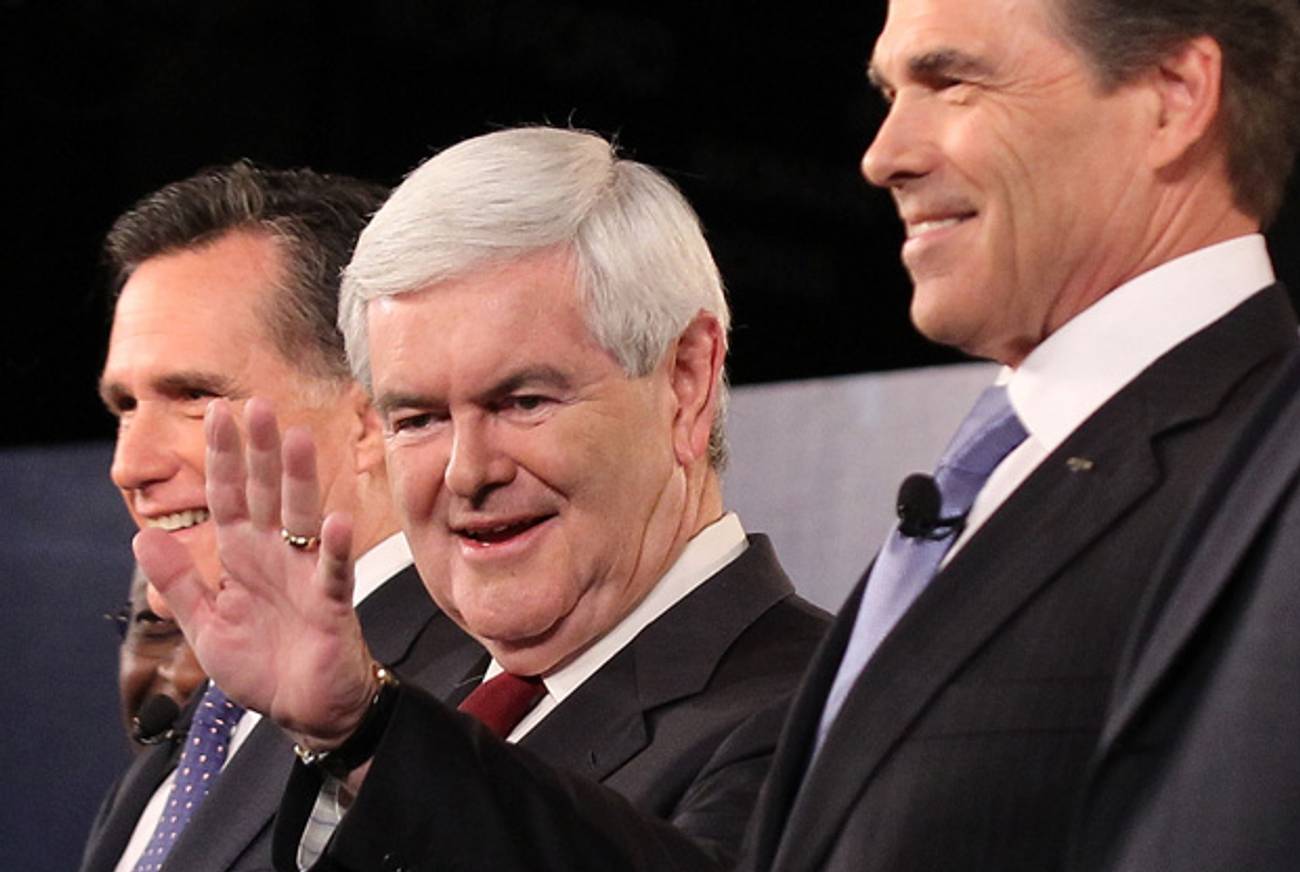GOP Debate Prompts Clash on Iran, Israel
Obama, Republicans won’t completely ignore this stuff over the next year




Saturday night, in their 53rd debate (approximately) and first nationally televised one, the Republican presidential contenders at long last tackled foreign policy head-on. Key talking points relevant to this blog: Several pledged to be very tough on Iran (tougher than the Obama Administration, they said), potentially up to and including military action to prevent the development of nuclear weapons; and several pledged to rethink foreign aid—except, they all caveated through their staffs, when it comes to Israel.
This was the odd part. Gov. Rick Perry, never shy about proclaiming staunch support for Israel, started it off by declaring, of foreign aid, “Every country would start at zero.” Added frontrunner Mitt Romney: “I agree with Gov. Perry. Start everything at zero.” To which everybody who was watching (even the Republican Jewish Coalition) asked: Surely he didn’t mean every country? Well, no: A Romney spokesperson told Ben Smith that Romney was referring to Pakistan and not Israel. “Obviously,” the Perry campaign tweeted, “Israel is a special ally, and my bet is that we would be funding them.” Obviously.
Democrats naturally leaped in to take their shots. Conservative Ron Radosh (a Tablet Magazine contributor) theorizes that the “start at zero” gaffe could affect Israel insofar as it reflects genuine popular sentiment: “In the current budget cutting times, we would see many left-wing Democrats and neo-isolationist Republicans begin to argue that the U.S. gives too much foreign aid to countries.” He needn’t worry. The incident reminded me of a similar slip-up that House Majority Leader Eric Cantor—the highest-ranking Jewish legislator in U.S. history—committed almost exactly a year ago. Cantor proposed that Israeli foreign aid be separated from other foreign aid, the better to cut the latter while preserving the former. His obvious pro-Israel sentiment got him little credit with AIPAC itself, which cautioned against isolationism. Cantor quickly recanted. In all instances, a Republican was moved by Tea Party isolationism, which is real, to utter something that rubbed pro-Israel folks the wrong way; their lack of foreign policy experience provided no stopgap to uttering something sure to catch the attention of supporters of Israel (and perhaps their lack of intelligence? It’s telling that everyone understands that Romney was simply misunderstood but Perry does not get the same benefit of the doubt). Long-term, the trends Radosh identifies probably should concern supporters of aid. Short-term, however, whoever is elected president in 2012 is going to continue funding Israel at current levels, in part because, structurally, the U.S.-Israel alliance is strong and makes sense for reasons external to either party’s ideology.
Meanwhile, the leader Romney, the surging Newt Gingrich, and the back-bencher Rick Santorum all slammed Obama for not holding up an intimidating enough stick when it comes to Iran. “If we re-elect Barack Obama, Iran will have a nuclear weapon,” said Romney. “And if you elect Mitt Romney, Iran will not have a nuclear weapon.” Here’s hoping he is, respectively, wrong and right! (And here’s hoping we remember to hold him to this five years from now!) Gingrich, whose reputation for intellect and detached persona makes him the Adlai Stevenson of the contemporary Republican Party (which says pretty much everything), alleged the president “skipped all the ways to be smart,” such as conducting covert operations or cooperating with Israel against Iran; presumably doing both doesn’t count.
In response, Team Obama has pushed back with insistences that the United States has greatly delayed Iran’s nuclear weapons program, and that its skillful diplomacy has even brought China and Russia around (somewhat). In a Haaretz op-ed being circulated, former Democratic congressman Mel Levine asserts that, on Iran, Obama has done everything the Republicans say they would do and accuse him of having failed to do.
The Obama side’s response is telling in two ways. First, in punching back immediately and forcefully, they demonstrated that, despite the predominance of economic issues in the coming campaign, foreign policy—and particularly Iran—will be important, too. And, second, in focusing almost entirely on Romney—the Levine op-ed is basically an exclusive attack on him—they signaled whom they believe their most dangerous opponent to be. (Hint: not Rick Perry.)
Up for Debate: Foreign Policy and Obama [NYT]
Foreign Aid to Zero [Ben Smith]
No to Starting at Zero [Pajamas Media]
At Least 3 GOP Candidates Say War With Iran Is an Option
Obama Has Kept Iran Threat at Bay, and U.S. Republicans Know It [Haaretz]
Earlier: Cantor’s Foreign Aid ‘Trial Balloon’ Is Popped
Perry’s Ascent Heralds Israel’s Rise as Issue
How Stuxnet Came To Be
Marc Tracy is a staff writer at The New Republic, and was previously a staff writer at Tablet. He tweets @marcatracy.